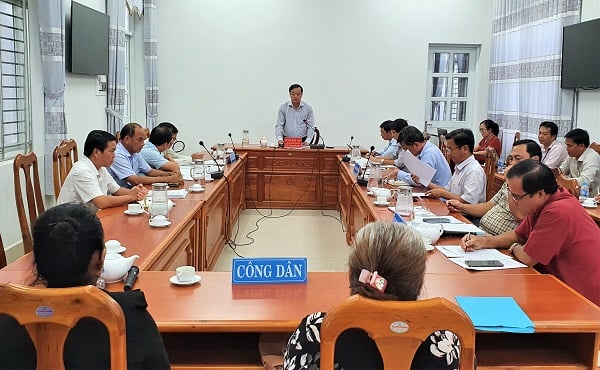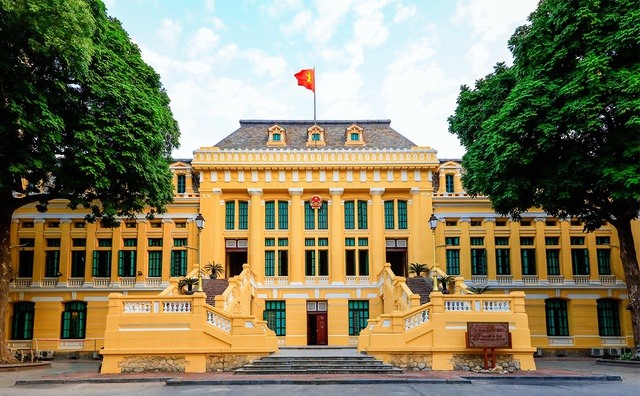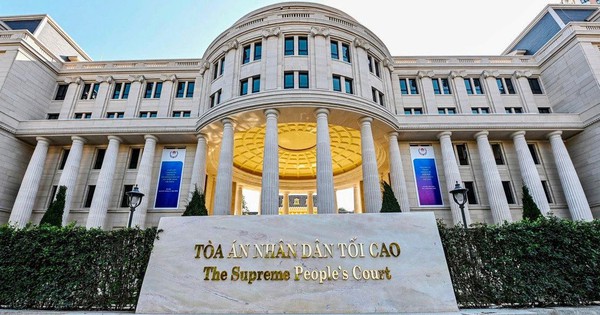Guidelines for standardizing data on online revenue collection, reconciliation, and refunds of financial obligations in Vietnam
Standardizing revenue data, reconciling and online refunding of financial obligations is an important part of reforming tax administrative procedures in Vietnam.

Guidelines for standardizing data on online revenue collection, reconciliation, and refunds of financial obligations in Vietnam (Internet image)
On May 21, 2024, the Ministry of Finance issued Official Dispatch 5196/BTC-KBNN, providing guidelines for standardizing data on online revenue collection, reconciliation, and refunds of financial obligations in the implementation of administrative procedures and public services submitted to the State Budget of Vietnam.
Guidelines for standardizing data on online revenue collection, reconciliation, and refunds of financial obligations in Vietnam
Based on the provisions of the current legal documents on fee collection, charges, and fines (including administrative fines and other penalties), the Ministry of Finance of Vietnam provides guidelines for standardizing data on revenue collection (fees, charges, and fines), reconciliation, and refunds of financial obligations in the implementation of administrative procedures and public services submitted to the State budget, excluding tuition fees and hospital fees, as follows:
(1) Standardizing data on fee collection, charges, and fines
- Revenue collection agencies (fee collection organizations, fee collection agencies, and fine collection agencies) must ensure the identification of revenue items as prescribed in Clause 1, Article 27 of Circular 01/2023/TT-VPCP dated April 5, 2023, issued by the Government Office, which regulates certain contents and measures for digitizing documents, results of administrative procedures, and implementing administrative procedures in the electronic environment.
The revenue collection agencies are requested to establish connections and share data on revenue item identification with the National Public Service Portal to enhance online revenue collection and reconciliation on the National Public Service Portal. In cases where revenue collection agencies have not shared information on revenue item identification, they must provide guidance to ensure that the submitters provide complete information as required in Clause 1, Article 27 of Circular 01/2023/TT-VPCP.
- Banks and intermediary payment service providers must ensure that payment documents generated during the resolution of administrative procedures and public services include all the information specified in Clause 1, Article 27 of Circular 01/2023/TT-VPCP.
- When collecting fees, charges, and fines, banks or intermediary payment service providers must ensure the transmission of complete and intact information on the seven revenue fields in the Payment Order Content field according to the structure specified in Clause 3, Article 27 of Circular 01/2023/TT-VPCP.
(2) Reconciliation of fee collection, charges, and fines
- At the end of the day, reconciliation must be conducted between banks, intermediary payment service providers, and the agencies or units responsible for resolving administrative procedures to ensure accurate and matching transaction data, including the name of the submitter, revenue item identification code, the name and account number of the beneficiary unit, and the amount (regulated in Clauses 7 and 8, Article 13 of Decree 45/2020/ND-CP issued by the Government on the implementation of administrative procedures in the electronic environment).
- Banks, intermediary payment service providers, local departments, and the State Treasury must update transaction information and documents on the National Public Service Portal, the Information System for Administrative Procedure Resolution, and conduct cross-checking to support and facilitate the accounting of payment transactions on the National Public Service Portal, in accordance with the provisions of Article 28 and Article 29 of Circular 01/2023/TT-VPCP dated April 5, 2023, issued by the Government Office, which regulates certain contents and measures for digitizing documents, results of administrative procedures, and implementing administrative procedures in the electronic environment.
- At the end of the day, the State Treasury must synchronize the generated revenue amount from fee collection, charges, and fines at the local State Treasury, including revenue collected through the National Public Service Portal and other collection methods (synchronized information based on the revenue collection statement - Appendix attached), to serve the reconciliation of financial obligations in the resolution of administrative procedures.
In cases where the reconciliation does not match the revenue collection statement of the State Treasury, the revenue collection agency must inform the bank/intermediary payment service provider about not receiving payment document information from the State Treasury.
The bank/intermediary payment service provider is responsible for clarifying the reasons for not transferring revenue information to the State Treasury, explaining to the revenue collection agency about the failure to transfer revenue information to the State Treasury, and ensuring the payment of fees, charges, fines, and late transfer fees in accordance with the provisions of laws, rectifying the consequences of their own violations, and notifying the progress and results of the resolution to the revenue collection agency.
(3) Regarding the refund of fees, charges, and fines
* Refund of fees and charges
- The revenue collection agency is responsible for monitoring the detailed information of fees and charges that must be paid, have been paid, and need to be refunded for each entity. They should verify, reconcile, and determine the refundable amount, ensuring that refunds are made to the correct entities and for the correct overpaid or mistakenly paid amounts.
- The designated account holder for fee and charge collection of the revenue collection agency, held at a bank or an account for fees and charges awaiting transfer to the state budget at the State Treasury, should issue payment orders requesting the bank/State Treasury to refund those who have made mistaken payments (such as multiple payments, payments to the wrong account) or overpaid (such as cases where administrative service procedures were not resolved).
- Periodically, the revenue collection agency shall report on the settlement of fee and charge collection, payment, and utilization to the tax authority in accordance with the provisions of the Law on Tax Administration and relevant guidelines.
* Refund of fines
State authorities with the authority to decide on the imposition of fines or superior authorities of the agency that issued the fine decision shall carry out the refund according to the regulations stated in Article 10 of Circular 328/2016/TT-BTC dated December 26, 2016, issued by the Ministry of Finance guiding the collection and management of state budget revenues through the State Treasury, which has provided instructions on the refund of state budget revenues and was amended in Article 1, Section 9 of Circular 72/2021/TT-BTC dated August 17, 2021, issued by the Ministry of Finance amending and supplementing certain provisions of Circular 328/2016/TT-BTC.
More details can be found in Official Dispatch 5196/BTC-KBNN dated May 21, 2024 for further information.
- Key word:
- Vietnam
- Resolution 190: Guidance on citizen reception, complaint and denunciation resolution during organizational restructuring process in Vietnam
- Provisions on naming and use of seals after the organizational restructuring in Vietnam according to Resolution 190
- Continue to implement regulations related to the operation of four-wheeled vehicles with engines in Vietnam
- Supreme People's Court of Vietnam will conducting asset and income verification of 37 individuals in 2025
- Provision of public information services to support public access to information in particularly difficult communes in Vietnam from April 5, 2025
- General principles for allocating public investment capital from the state budget in Vietnam for the 2026 - 2030 period
-

- Resolution 190: Guidance on citizen reception ...
- 09:00, 22/02/2025
-

- Provisions on naming and use of seals after the ...
- 08:00, 22/02/2025
-

- Supreme People's Court of Vietnam will conducting ...
- 17:00, 21/02/2025
-

- Provision of public information services to support ...
- 16:30, 21/02/2025
-

- Supreme People's Court of Vietnam reduces to 10 ...
- 16:23, 21/02/2025
-

- Resolution 190: Guidance on citizen reception ...
- 09:00, 22/02/2025
-

- Provisions on naming and use of seals after the ...
- 08:00, 22/02/2025
-

- Continue to implement regulations related to the ...
- 17:30, 21/02/2025
-

- Amendments to regulations on the salary scale ...
- 17:30, 21/02/2025
-

- Supreme People's Court of Vietnam will conducting ...
- 17:00, 21/02/2025

 Article table of contents
Article table of contents
